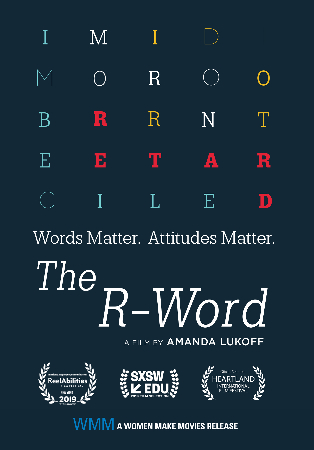
The R Word 2020
Distributed by Women Make Movies, 115 W. 29th Street, Suite 1200,New York, NY, 10001; 212-925-0606
Produced by Amanda Lukoff and Daniel Egan
Directed by Amanda Lukoff
Streaming, 65 mins
K-General Adult
Disabilities; Diversity; Social Movements
Date Entered: 10/29/2021
Reviewed by Shanna Hollich, Interim Director of Library Services, Wilson CollegeAmanda Lukoff’s The R Word takes a closer look at the derogatory language we use to describe people with intellectual and developmental disabilities, and it outlines the impact that language has had both historically and today in the disability community.
The story centers initially on the personal narrative of filmmaker Amanda Lukoff, who grew up advocating for her sister Gabrielle, a young woman living with developmental disability. There is a danger here, in that the film begins by veering perilously close to what disability advocates frequently term “inspiration porn,” or the portrayal of people with disabilities solely as sources of inspiration, especially in regards to the metaphor of “overcoming challenges” used to motivate and inspire abled people. This often happens particularly with well-meaning friends and family members such as Lukoff, who sometimes elide or erase the voices of actual disabled people in their zeal to advocate for what they feel is best for their loved ones.
However, the film does an adequate job of skirting this possibility by expanding its storytelling to include three other families, representing disability across a range of genders, ages, and family dynamics, in addition to a range of outside voices. The story of Jason Newbury, for example, is that of a 25-year-old man in a romantic relationship learning how to find independence from his parents and navigate the world on his own as a young adult, a story that is relatable to many regardless of their disability status, and an example that helps everyone understand the sense of shared humanity that is the film’s ultimate goal.
The film’s production value is good - there are interviews here with renowned experts, including lexicographers, professors, directors of nonprofits and aid organizations, and the author of The N-Word, Jabari Asim, as well as interviews with people on the street and clips from popular media (music, television shows, movies), that all do an effective job of framing the issue of derogatory language and how powerful its implications and effects can be. The use of animations peppered throughout helps break the tension of a difficult topic and make the storytelling more effective. The true highlight of the film is the interview scenes with disabled self-advocates, which includes the disabled family members at the heart of the story but also self-advocates from nationwide disability organizations and other disability experts. Ideally, the film would have focused even more here, to truly allow members of the disabled community to speak for themselves about the history of how they have been discussed and portrayed in both popular media and in their personal lives and to show more clearly how negative stereotypes and cultural bias have impacted their lives.
Ultimately, this film appears to have been made for a general audience, and I would recommend it for one. It would be a fine addition for a general public interest collection. Though it’s more of a popular film than a scholarly one, it would also be appropriate in introductory undergraduate courses, particularly in fields that deal with social problems, healthcare, communication, and working effectively with others. I would not recommend this film for advanced disability justice programs, and it is not a serious disability studies film, but it can serve as a solid introduction for why disability justice is important and why these issues matter.
Awards: Official Selection at Twin Cities Film Fest (2021); SXSW EDU (2019); ReelAbilities Film Festivals in New York, Pittsburgh, New Jersey, Cleveland, and Los Angeles (2019); Heartland International Film Festival (2019)
Published and licensed under the Creative Commons Attribution 4.0 license. Anyone can use these reviews, so long as they comply with the terms of the license.